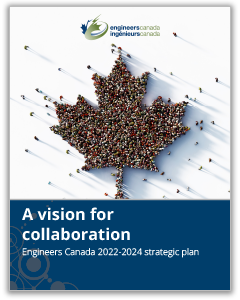
This document sets out Engineers Canada strategic priorities for 2022-2024 as we work to advance engineering through national collaboration.
Download a PDF
Click the download button to view of a PDF version of the 2022-2024 strategic plan.
This plan is built in response to some of the major trends and risks that have been identified throughout the strategic planning process. In particular:
- Our regulatory landscape is evolving rapidly. Governments are increasingly demanding that provincial and territorial engineering regulators demonstrate how the regulatory framework and associated processes are necessary to protect the public.
- Technological innovation drives the creation of new engineering disciplines and practices, increases the potential for overlap with other professions, and challenges regulators to provide support and enforcement in these areas.
- An increasing proportion of graduates from accredited programs do not seek licensure. Younger generations have different career paths, which might not necessarily be compatible with the traditional licensure path.
- COVID-19 has disproportionately affected the careers paths of women and requiring even greater sustained efforts to build a more equitable, inclusive and diverse profession.
It is with these factors in mind, and after extensive consultation with the Engineers Canada Board, provincial and territorial engineering regulators, Engineering Deans Canada, our staff, the Canadian Engineering Accreditation Board, and the Canadian Engineering Qualifications Board that we identified three areas of focus for the next three years:
1. Advance the engineering regulatory framework
Our work supports engineering regulators in fulfilling their mandates of protecting the public. Key to our success is our ability to foster collaboration and support pan-Canadian implementation of consistent requirements and practices. We will investigate a national academic requirement for licensure, re-examine the purpose of accreditation, identify areas for national collaboration, and support adaptation to emerging areas of engineering practice.
2. Champion an equitable, diverse, inclusive, and trustworthy engineering profession
We are the national voice of the profession and we are committed to a more equitable, diverse and inclusive profession. Our success is tied to our ability to foster public trust and demonstrate the relevance of our profession with younger generations and employers. We will amplify our 30 by 30 initiative in order to increase the percentage of newly licensed engineers who are women, reinforce trust in the profession among Canadians, and demonstrate the value of licensure among engineering graduates.
3. Uphold our commitment to excellence
We are committed to continually measure ourselves against best practices and hold ourselves accountable to enhance our products and service delivery for the benefit of regulators, staff, and stakeholders.
Our work supports engineering regulators in fulfilling their mandates of protecting the public. Key to our success is our ability to foster collaboration and support pan-Canadian implementation of consistent requirements and practices. We will investigate a national academic requirement for licensure, re-examine the purpose of accreditation, identify areas for national collaboration, and support adaptation to emerging areas of engineering practice. Our priorities are to:
1.1 Investigate and validate the purpose and scope of accreditation
 WHAT WE WILL DO
WHAT WE WILL DO
Major regulatory and educational changes have taken place since the creation of the Canadian engineering accreditation system in 1965. We will conduct a fundamental review of the accreditation process, investigate the best practices in engineering education, and collectively work with regulators and stakeholders to understand if there is a desire to adopt a new, national academic requirement for licensure as well as an updated purpose of accreditation. If there is, we will reconsider accreditation criteria and procedures.
 HOW
HOW
- Benchmark the Canadian engineering accreditation system
- Investigate a minimum academic requirement for licensure
- Re-examine the purpose of accreditation in the context of the overall licensure system
- Hire external expertise and convene pan-Canadian, multi-stakeholder advisory groups to inform all recommendations
 WHAT DOES SUCCESS LOOK LIKE?
WHAT DOES SUCCESS LOOK LIKE?
- All stakeholders understand the purpose of accreditation
- Regulators have an academic requirement for licensure, applicable to all
- Engineers Canada, including the CEAB and CEQB, have direction to implement systems aligned with the purpose and the academic requirement for licensure
1.2 Strengthen collaboration and harmonization
 WHAT WE WILL DO
WHAT WE WILL DO
Fostering collaboration and consistency of requirements, practices, and processes across jurisdictions is at the heart of our mandate. We will work with regulators to understand barriers and success factors leading to harmonization and facilitate the adoption of a national agreement that will establish the principles and areas where pan-Canadian harmonization will be sought.
 HOW
HOW
- Collaborate with regulator staff to identify barriers and opportunities
- Develop a national statement of collaboration with all jurisdictions
- Identify specific areas of harmonization for collaboration
 WHAT DOES SUCCESS LOOK LIKE?
WHAT DOES SUCCESS LOOK LIKE?
- Engineers Canada has a clear mandate and key focus areas for harmonization
- Regulators benefit from collaboration and resource sharing, supporting improved practice
1.3 Support regulation of emerging areas
 WHAT WE WILL DO
WHAT WE WILL DO
Technological advances move much faster than legislative change and engineers who work in emerging areas of practice may not fully understand or consider the long-term professional and ethical impacts and obligations. We will provide information to regulators on the long-term impacts of engineering practice in emerging areas and a framework for the evaluation of professional and ethical obligations. This will enable regulators to educate license holders in these emerging areas of practice and regulate more effectively.
 HOW
HOW
- Identify and investigate new and overlapping areas of engineering practice that will have a long-term impact on the public
- Continue to work with the federal government to promote the role of engineers in emerging areas
 WHAT DOES SUCCESS LOOK LIKE?
WHAT DOES SUCCESS LOOK LIKE?
- Regulators receive information that helps them adapt their admission, enforcement, and practice-related processes and uphold the framework for ethical practice
- The federal government is made aware of the importance of the work of engineers in emerging areas
We are the national voice of the profession and we are committed to a more equitable, diverse and inclusive profession. Our success is tied to our ability to foster public trust and demonstrate the relevance of our profession with younger generations and employers. We will amplify our 30 by 30 initiative in order to increase the percentage of newly licensed engineers who are women, reinforce trust in the profession among Canadians, and demonstrate the value of licensure among engineering graduates. Our priorities are to:
 WHAT WE WILL DO
WHAT WE WILL DO
As the engineering profession is at risk of not meeting its national goal of having 30 per cent of newly licensed engineers being women by 2030, there is a need to sustain momentum, augment our efforts, and strengthen our support of regulators while not duplicating efforts. We will continue accelerating 30 by 30 through collecting and sharing information on best practices, supporting regulators in their work, and organizing a national 30 by 30 conference.
 HOW
HOW
- Hire external expertise to conduct research on the perceptions of women who graduate from engineering programs and/or are eligible for licensure and the barriers that they encounter, including in the workplace
- Share the results of research with regulators and employers
- Provide a 30 by 30 report card and needs assessment to interested regulators and continue to convene groups to facilitate sharing of best practices
- Organize an annual national 30 by 30 conference that focuses on sharing innovative ideas and practices
 WHAT DOES SUCCESS LOOK LIKE?
WHAT DOES SUCCESS LOOK LIKE?
- Regulators have information and support that enables them to increase inclusion and the number of engineering graduates who proceed through the licensure processes
- Representation of women is increasing within every step of the pipeline: students at Higher Education Institutions (HEIs), graduates, engineers-in-training* (EITs), newly licensed engineers, and engineers
- Employers have information that enables them to make their workplaces more equitable, diverse and inclusive
2.2 Reinforce trust and the value of licensure
 WHAT WE WILL DO
WHAT WE WILL DO
There is a lack of information on the profile and licensure motivators of engineers, engineering students, engineering graduates, and EITs. More research is needed to understand the perceptions of engineering employers on the requirement and value of licensure. Relative to other professions, the public has only moderate familiarity and trust with engineers. We will bridge this gap by creating and promoting a consistent, national message that will showcase the diversity of the profession, the breadth of engineering in both traditional and new disciplines, and the value of engineering licensure to the public, engineering graduates, EITs, and employers.
 HOW
HOW
- Conduct market research to identify and understand appropriate target audience
- Develop national value-of-licensure messaging in collaboration with regulators
- Launch a multi-year, multi-million-dollar, national marketing campaign, co-branded and delivered in partnership with regulators
 WHAT DOES SUCCESS LOOK LIKE?
WHAT DOES SUCCESS LOOK LIKE?
- Targeted public audiences perceive engineers as trustworthy and recognize engineering as a licensed profession
- Engineering graduates and EITs recognize value in licensure
- Regulators have a valuable national framework and marketing support tools
We are committed to continually measure ourselves against best practices and hold ourselves accountable to enhance our products and service delivery for the benefit of regulators, staff, and stakeholders. Our priority is to:
3.1 Uphold our commitment to excellence
 WHAT WE WILL DO
WHAT WE WILL DO
The demand for change continues and we are facing pressure to deliver on the diverse and changing needs of engineering regulators, higher education institutions, and the engineering community. To continually adapt, we need an effective and sustainable approach that ensures that we are a high performing organization. By 2024, we will achieve Platinum level certification from Excellence Canada by demonstrating measurable, sustained, and improving performance over at least a three-year period as measured against the Excellence, Innovation and Wellness Standard.
 HOW
HOW
- Achieve Platinum level certification from Excellence Canada
 WHAT DOES SUCCESS LOOK LIKE?
WHAT DOES SUCCESS LOOK LIKE?
- Regulators, HEIs, and the engineering community benefit from effective delivery of products and services
- Staff benefit from increased engagement and retention, working in motivated teams, and improved health
- Engineers Canada benefits from sustainment of a high level of performance
Engineers Canada upholds the honour, integrity, and interests of Canadian engineering by supporting consistent high standards in regulation, encouraging the growth of the profession in Canada, and inspiring public confidence. Our work is focussed on ten core purposes, as established by Engineers Canada’s members, the engineering regulators:
- Accrediting undergraduate engineering programs.
- Facilitating and fostering working relationships between and among the regulators.
- Providing services and tools that enable the assessment of engineering qualifications, foster excellence in engineering practice and regulation, and facilitate mobility of practitioners within Canada.
- Offering national programs.
- Advocating to the federal government.
- Actively monitoring, researching, and advising on changes and advances that impact the Canadian regulatory environment and the engineering profession.
- Managing risks and opportunities associated with mobility of work and practitioners internationally.
- Fostering recognition of the value and contribution of the profession to society and sparking interest in the next generation of professionals.
- Promoting equity, diversity, and inclusion in the profession that reflects Canadian society.
- Protecting any word(s), mark, design, slogan, or logo, or any literary, or other work, as the case may be, pertaining to the engineering profession or to its objects.
sp blue section w bgs
We are successful when we convene, facilitate, and support our partners to come together and make evidence-based decisions for the benefit of the public. We recognize that our profession is facing challenges and are confident that we can confront them together. The sum of our efforts will be stronger than all of our individual parts. Our vision is:
Advancing Canadian engineering through national collaboration
Our work is guided by our staff values and Board guiding principles:
Our staff:
- Take pride in creating a culture of teamwork and wellness
- Earn credibility through high-quality work
- Foster new ideas and embrace creative approaches
- Are transparent and accountable
- Create and sustain trusting relationships
- Rely on diverse people and perspectives to enrich our work
Our Board commits to:
- Serve the needs of the regulators
- Ensure transparency and accountability in the decision-making process
- Encourage commitment and engagement of regulators
- Encourage equity, diversity and inclusion in the Canadian engineering profession






